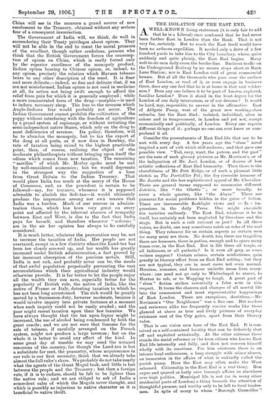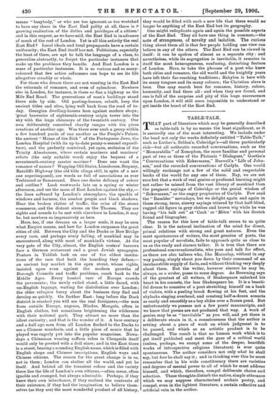THE ISOLATION OF THE EAST END. A WELL-KNOWN living statesman (it
is only fair to add that he is a Liberal) once confessed that he had never been farther East in London than the Bank. That is not very far, certainly. But to reach the East itself would have been no arduous expedition. It needed only a. drive of a few hundred yards to take him to the City boundary, where, quite suddenly and quite plainly, the East End begins. Many well-to-do men daily cross the border-line. Business traffic on the Underground Railway by no means stops short at Mark Lane Station; nor is East London void of great commercial houses. But of all the thousands who pass over the surface of East London, or read of it, or even engage in business there, does any one feel that he is at home in that vast wilder- ness? Does any one believe it to be part of known, explored, familiar London ? Does it stand in the least degree for the London of our daily intercourse, or of our dreams ? It would be hard, nay, impossible, to answer in the affirmative. East of Aldgate Pump, west of the great new working-class suburbs, lies the East End : isolated, individual, alien in colour and in temperament, in London and yet not, except economically and politically, of London. Every one reports different things of it : perhaps no one can ever know or com- prehend it all.
Consider the presentments of East End life that are to be met with every day. A few years ago the " slum" novel inspired a sort of cult which still endures ; and that gave one possible view. "Toil, envy, want, the patron, and the gaol" are the sum of such gloomy pictures as Mr. Morrison's, or of the indignation of Mr. Jack London, or of dozens of less artistic reflections of East End humanity. Then there is the cheerfulness of Mr. Pett Ridge, or of such a pleasant little sketch as The Partidaer Pet ; the dry riverside humour of Mr. Jacobs and the less sophisticated appeal of Mr. Chevalier. There are general terms supposed to summarise different districts, like " the Ghetto " ; or more broadly, to cover a whole quarter, like "the Abyss." There are panaceas for social problems bidden in the guise of fiction. There are innumerable flashlight views and se fa .e im- pressions in the daily Press. One might chronicle the varieties endlessly. The East End, whatever it be in itself, has certainly not been neglected by literature and the stage. But is such a cult rational or just ? In all these voices, no doubt, one may sometimes catch an echo of the real thing. They rehearse for us certain aspects as certain men (or many men) see them. No doubt, too, there are tragedies, there are humours, there is pathos, enough and to spare many times over, in the East End. But is life there all tragic, or all ludicrous, or all pathetic?! Is it even all grey, as some writers suggest? Certain crimes, certain misfortunes, gain greatly in literary effect from an East End setting; but they are not typical, they are in most cases not even normal. Heroism, romance, and humour underlie mean lives every- where: one need not go only to Whitechapel to starve, to Hoxton to rob, or to Wapping to laugh. A great part of " slum " fiction strikes essentially a false note in this respect. It turns the chances and changes of all mortal life into the commonest and most representative happenings of East London. There are exceptions, doubtless,—Mr. Nevinson's "Our Neighbours" was a fine one. But readers and reviewers alike too frequently receive works like those glanced at above as true and lively pictures of everyday existence east of the City gates, apart from their literary value.
That is one vision men have of the East End. It is con- ceived as a self-contained locality that can be definitely shut off and exploited artistically. At the other extreme there stands the social reformer or the keen citizen who knows East End life internally and fully, and does not concern himself wholly with its emotions. For him existence there is an intense local enthusiasm, a long struggle with minor abuses, an immersion in the affairs of what is unkindly called the parish pump. Here the East may often make the West ashamed. Citizenship in the East End is a real thing. Men argue and quarrel as hotly over borough affairs as elsewhere over high politics. Municipal life is not (as in many other residential parts of London) a thing beneath the attention of thoughtful persons, and worthy only to be left to local trades- men. In spite of many to whom "Borough Councillor" means "busybody," or who are too ignorant or too wretched to have any share in the East End polity at all, there is 11 growing realisation of the duties and privileges of a citizen; and in this respect, as we have said, the East End is in advance of much of the rest of London. Yet is all this activity the real East End ? Local ideals and local propaganda have a certain uniformity; the East End itself has not. Politicians, especially the least of them, are apt to talk the language of a class, to generalise abstractly, to forget the particular instances that make up the problems they handle. And East London is a mass of particular instances. It is so various and so many- coloured that few active reformers can hope to see its life altogether steadily or whole.
For those who dream there are not wanting in the East End the externals of romance, and even of splendour. Nowhere else in London, for instance, is there so fine a highway as the Mile End Road. The generations of man's buildings stand there side by side. Old posting-houses, rebuilt, keep the ancient titles and sites, lying well back from the road of to- day. Georgian dwelling-houses lean against modern shops ; *great breweries of eighteenth-century origin tower into the sky with the huge chimneys of the twentieth century. Our own deliberately conceived charity ranges with the pious creations of -another age. Was there ever such a group within a few hundred yards of one another as the People's Palace, the ancient " House of the Sick" of the Portuguese Jews, the London Hospital (with its up-to-date penny-a-second expendi- ture), and the perfectly contrived, yet open, seclusion of the Trinity Almshouses, where certain mariners and mariners' relicts (the only suitable word) enjoy the bequest of a seventeenth-century master mariner? Does one want the romance of names ? Wapping Old Stairs, Limehouse, Stepney, Ratcliffe Highway (the old title clings still, in spite of a new one superimposed), are words as full of associations as ever Trebizond or Samarcand. Does one desire delicacy of colour and outline ? Look westwards late on a spring or winter afternoon, and see the mass of East London against the sky,— the lines softened by London's atmosphere, the sparkle of windows and harness, the sombre people and black shadows. Hear the broken clatter of traffic, the cries of the street commerce, and the distant sirens on the Thames. They are sights and sounds to be met with elsewhere in London, it may be, but nowhere so impressively as here.
Here, too, if one dreams on a larger scale, it may be seen what Empire means, and how far London surpasses the great cities of old. Between the City and the Docks or Bow Bridge -every race, and perhaps every failing, of mankind may be encountered, along with most of mankind's virtues. At the very gate of the City, almost, the English .costers' barrows face a German restaurant and a great Jewish synagogue. Posters in Yiddish look on one of the oldest institu- tions of the race that built the hoarding they deface,— an ancient hay market in the open street, whose rights, insisted upon even against the modern growths of Borough Councils and traffic problems, reach back to the Middle Ages. Every hunted race of Europe crowds the pavements ; the newly exiled stand, a little dazed, with un-English luggage, waiting for distribution over London; the older refugees hurry about the business they find and develop so quickly. Go further East : long before the Dock district is reached you will see the real foreigners,—the men from outside Europe, negroes, Hindus, Mongols, often in English clothes, but sometimes brightening the wilderness with their national garb. They attract no more than the idlest curiosity ; and that is the wonder of it. A bare century and a half ago men from all Loudon flocked to the Docks to see a Chinese mandarin, and a little piece of music that he played was eagerly put into the popular magazines. Nowa- days a Chinaman wearing saffron robes in Cheapside itself would only be greeted with a dull stare; and in the East there is a street, bearing a sounding English name, which is filled with English shops and Chinese inscriptions, English ways and Chinese citizens. The reason for the great change is in us, not in them ; London can shelter all the world, and yet be itself. And behind all the transient colour and the variety there lies the life of London's own citizens,—often mean, often ignoble and cramped, but always admirable. Perhaps, if they knew their own inheritance, if they realised the contrasts of their existence, if they had the imagination to believe them- selves (as they are) the most wonderful product of all history, they would be filled with such a new life that there would no longer be anything of the East End but its geography.
One might reduplicate again and again the possible aspects of the East End. They all have one thing in common,—the note of strangeness, of novelty and isolation. The curious thing about them all is that few people bolding one view can believe in any of the others. The East End can be viewed in itself: it can be spoken of almost as a separate city : and nevertheless, while its segregation is inevitable, it remains in itself the most heterogeneous, confusing, disturbing feature of London. Here, to take the phrases of a poet who knew both cities and romance, the old world and the knightly years have left their far-reaching traditions ; Babylon is here with its many tongues and its many colours; the Christian slave is here. One may search here for romance, history, colour, humanity, and find them all : and when they are found, and one is full of the surprise and pity of this huge excrescence upon London, it will still seem impossible to understand or get inside the heart of the East End.











































 Previous page
Previous page